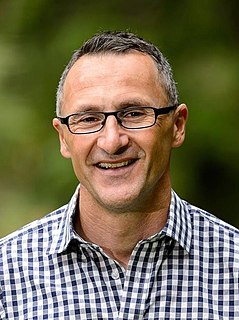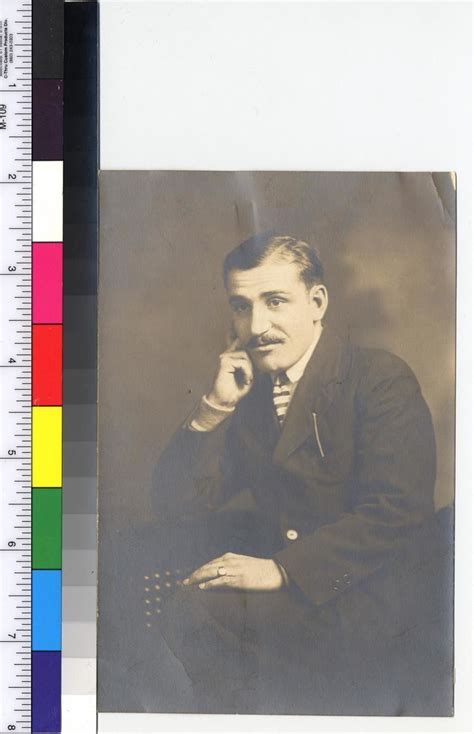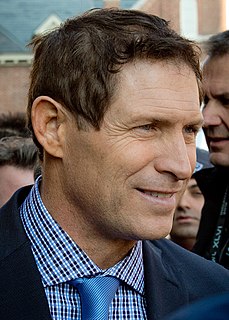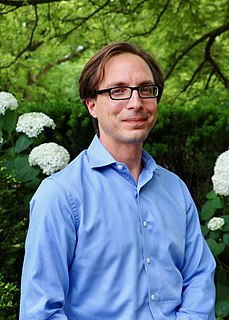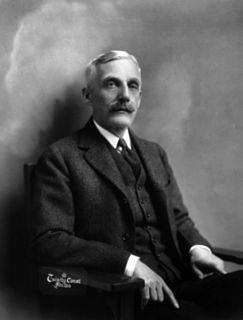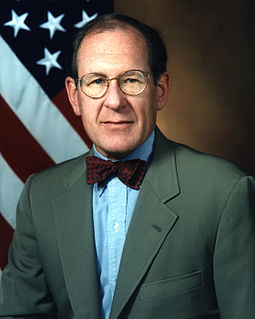Top 779 Farmers And Ranchers Quotes & Sayings - Page 13
Explore popular Farmers And Ranchers quotes.
Last updated on April 20, 2025.
Now musing o'er the changing scene Farmers behind the tavern screen Collect; with elbows idly press'd On hob, reclines the corner's guest, Reading the news to mark again The bankrupt lists or price of grain. Puffing the while his red-tipt pipe He dreams o'er troubles nearly ripe, Yet, winter's leisure to regale, Hopes better times, and sips his ale.
What is new, however, is always evil, being that which wants to conquer and overthrow the old boundary markers and the old pieties; and only what is old is good. The good men are in all ages those who dig the old thoughts, digging deep and getting them to bear fruit - the farmers of the spirit. But eventually all land is depleted, and the ploughshare of evil must come again and again.
Why should all virtue work in one and the same way? Why should all give dollars? It is very inconvenient to us country folk, and we do not think any good will come of it. We have not dollars; merchants have; let them give them. Farmers will give corn; poets will sing; women will sew; laborers will lend a hand; the children will bring flowers.
The government will pay certain farmers to not grow corn. Wow. Where's my check? That'd be great. "Hey, what do you do for a living?" "Well, I don't grow corn. Get up at the crack of noon, make sure there's no corn growing. I'm gonna get up early tomorrow. And not plow. You know, we used to not grow tomatoes-but there's more money in not growing corn."
To put it bluntly, we now need to reverse course. We need more highly skilled small farmers in more places all across America - not as a matter of nostalgia for the agrarian past but as a matter of national security. For nations that lose the ability to substantially feed themselves will find themselves as gravely compromised in their international dealings as nations that depend on foreign sources of oil presently do. But while there are alternatives to oil, there are no alternatives to food.
I've worked with farmers in Zimbabwe who've lost their lands. I've worked with people in Venezuela, under threat of kidnappings, whose external world is unstable. But they have very strong social connections with their family and friends. And as a result, they're able to maintain a greater level of happiness and optimism than I've seen from bankers, consultants, or salespeople who are on the road all the time, who follow jobs separated from their families, and, as a result, find themselves missing out on the happiness that comes from those very connections that they severed.
I've long believed that one of the mainsprings of our own liberty has been the widespread ownership of property among our people and the expectation that anyone's child, even from the humblest of families, could grow up to own a business or a corporation. Thomas Jefferson dreamed of a land of small farmers, of shopowners, and merchants. Abraham Lincoln signed into law the Homestead Act that ensured that the great western prairies of America would be the realm of independent, propertyowning citizens-a mightier guarantee of freedom is difficult to imagine.
I would that our farmers when they cut down a forest felt some of that awe which the old Romans did when they came to thin, or letin the light to, a consecrated grove (lucum conlucare), that is, would believe that it is sacred to some god. The Roman made an expiatory offering, and prayed, Whatever god or goddess thou art to whom this grove is sacred, be propitious to me, my family, and children, etc.
The sense of it may come with watching a flock of cedar waxwings eating wild grapes in the top of the woods on a November afternoon. Everything they do is leisurely. They pick the grapes with a curious deliberation, comb their feathers, converse in high windy whistles. Now and then one will fly out and back in a sort of dancing flight full of whimsical flutters and turns. They are like farmers loafing in their own fields on Sunday. Though they have no Sundays, their days are full of sabbaths.
The American Dream is one of the greatest ideas in the history of human achievement . . . It thrives today in an age when its core components of freedom and opportunity are open to more Americans than ever before. It holds a real, identifiable place in the American heart and mind, and it informs the aspirations of everyone from farmers to software developers, from detectives to bankers, from soldiers to social workers . . . It defines us as a people, even as we add to its meaning with each new chapter in our national experience and our individual actions.
I've obviously come from a health background. I was a doctor before I became a pollie and one of the things I'd like to do is to really build on the world-class health system we've got. I'm passionate about climate change because it's also a health issue. Things like extreme weather impact on people's health, the ability of our hospitals to cope, the impact on mental health, on farmers in regional areas - they're all serious health concerns.
Exporters monitor economic and political policies to the developing world, but the consequences of that have been to make developing countries far more sensitive to the constant fluctuations. Developing countries are not always allowed to support their farmers in the same way as the U.S. or Europe is. They're not allowed to have tariff barriers. They're forced, more or less, to shrink their social programs. The very poorest people have fewer and fewer entitlements. The consequence of this has been that there's been a chronic increase in the vulnerability of those economies to price shocks.
There's also a growing trend toward having gardens in schools to literally show kids where food comes from by having them grow and prepare their own food. There's also a movement that's bringing farmers into schools and creating relationships between local farms and local cafeterias, so that instead of frozen mystery meat, you have fresh produce that's coming from the area that has a name and a face associated with it.
[Y]our agricultural revolution is not an event like the Trojan War, isolated in the distant past and without relevance to your lives today. The work begun by those neolithic farmers in the Near East has been carried forward from one generation to the next without a single break, right into the present moment. It's the foundation of your vast civilization today in exactly the same way that it was the foundation of the very first farming village.
There had been a popular joke on Freedom, started by a man named Calder. Looking down from space, he had said, the dominant life forms on Earth were obviously the cereals and other grasses. They occupied all the most desirable and fertile land; and they had tamed insects and animals to care for them. In particular, they had domesticated the bipeds to nurture and cultivate them and to save and plant their seed. Now, watching the farmers, Alex could easily imagine that they were worshiping and genuflecting before their masters.
In the 1960s, various parts of the population became energized and began to enter the public arena to call for the rights of women, students, young people, old people, farmers and workers. What are called "special interests" - meaning the whole population - they began to press to enter the public arena. And they said that puts too much pressure on the state and therefore we have to have more moderation in democracy and they should go back and be quiet and obedient.
The "health, education, and welfare" section of government is another boondoggle. First we manufacture indigent and superfluous people by legal monopolies in land, money and idea patents, erecting tariff barriers to protect monopolies from foreign competition, and taxing laborers to subsidize rich farmers and privileged manufacturers. Then we create "social workers, " etc., to care for them and thereby establish a self-aggravating and permanent institutionalized phenomenon.
I do think that there is a big difference between family farms and agri-business, and one of the distressing things that I think has occurred is with consolidation of farm lands. You've seen large agri-businesses benefit from enormous profits from existing farm programs, and I think we should be focusing most of those programs on those family farmers.
In Joel's view, that reformation begins with people going o the trouble and expense of buying directly from farmers they know - "relationship marketing," as he calls it. He believes the only meaningful guarantee of integrity is when buyers and sellers can look one another in the eye, something few of us ever take the trouble to do. "Don't you find it odd that people will put more work into choosing their mechanic or house contractor than they will into choosing the person who grows their food?"
I saw all that [white trash] growing up in Alabama and Georgia. I had a group of country cousins and we'd go visit them when I was a kid. They lived on a red dirt Georgia back road, in a shack, with twelve kids. Farmers. No electricity, they had a well on their back porch, but they had nothing, yet they were the happiest, freest people I'd ever met. I loved to visit them. Great sense of humor, and they kept up with all the latest music, country, rockabilly, that stuff. Great food they grew in the fields and canned. Happy people.
I describe what is happening as 'food fascism' because this system can only survive through totalitarian control. With patents on seed, an illegitimate legal system is manipulated to create seed monopolies. Seed laws that require uniformity - which criminalize diversity and the use of open-pollinated seeds - are fascist in nature. Suing farmers after contaminating their crops, [...] is another aspect of this fascism. Pseudo-hygiene laws that criminalize local, artisanal food are food fascism. And attacks on scientists and the silencing of independent research [...] are examples of knowledge fascism.
People like me start organizing conferences and editing journals, even become tenured professors talking about Empire of the Senseless with a bunch of wide-eyed kids from the farmland. If only one of those kids goes back home and lets her hogs out of the pen to go plum wild rolling around in their own slop while the neighboring farmers scratch their chins, then, isn't that worth it? Insert the same scenario with stockbrokers, stock-car drivers, and stock characters in the post-baccalaureate working man's sideshow, and well, that's viral reproduction.
India has the largest number of hungry people. Yet it's an outcome of precisely the same mechanism. It's the control of agriculture that drives down the price it paid for food that it buys from farmers, who are the poorest people. Then you're paying very little for food. You're underpaying the poorest people in any society. Then they're marketing to us the things that are most profitable to them. And those are the things that are packaged and processed and what-have-you. That means you have the simple thing of the explosion of obesity and hunger as a result of capitalism in our food system.
On the one hand, the Republicans are telling industrial workers that the high cost of food in the cities is due to this government's farm policy. On the other hand, the Republicans are telling the farmers that the high cost of manufactured goods on the farm is due to this government's labor policy. That's plain hokum. It's an old political trick: "If you can't convince 'em, confuse 'em." But this time it won't work.
If farmers and blacksmiths could win independence from an empire...if immigrants could leave behind everything they knew for a better life on our shores...if women could be dragged to jail for seeking the vote...if a generation could defeat a depression, and define greatness for all time...if a young preacher could lift us to the mountaintop with his righteous dream...and if proud Americans can be who they are and boldly stand at the altar with who they love...then surely, surely we can give everyone in this country a fair chance at that great American Dream.
The farmer and the farm, like "the environment," are looked upon, for example, as means to offset trade deficits. The farm is a place where we can externalize costs. The cost of pesticides to the farmer and the cost of the pesticides to the soil and groundwater are regarded similarly by the public: "a serious problem that something ought to be done about." But the problem is more fundamental than this glib statement would indicate, for soil pollution is an expense of production. So are pesticides and nitrates in our farm wells. So is the loss of farmers from the land.
American farmers produced 600 more calories per person per day in 2000 than they did in 1980. But some calories got cheaper than others: Since 1980, the price of sweeteners and added fats (most of them derived, respectively, from subsidized corn and subsidized soybeans), dropped 20 percent, while the price of fresh fruits and vegetables increased by 40 percent.
China is soon to be probably the most powerful nation in the world, but they only making like $10,000 a year, and that's doing it. They're balling on $10,000 a year, and this is the strongest nation? But it's a billion people. The way it breaks down, if you really look at it, it's still built on the poor, on the backs of hundreds of millions of destitute, impoverished farmers that you'll never see. You just see Shanghai and you see Hong Kong.
By the rude bridge that arched the flood,
Their flag to April's breeze unfurled,
Here once the embattled farmers stood,
And fired the shot heard round the world.
The foe long since in silence slept;
Alike the conqueror silent sleeps;
And Time the ruined bridge has swept
Down the dark stream which seaward creeps.
On this green bank, by this soft stream,
We set to-day a votive stone;
That memory may their deed redeem,
When, like our sires, our sons are gone.
Liquidate labor, liquidate stocks, liquidate the farmers, liquidate real estate. It will purge the rottenness out of the system. High costs of living and high living will come down. People will work harder, live a more moral life. Values will be adjusted, and enterprising people will pick up from less competent people.
It's as if the whole notion of growing soil is something only lunatics would think about. But why not grow soil? Does anything make more sense than growing soil? Isn't that more important than tractors, trucks, silos, barns, county fairs and country music? Of course it is. And yet to the lion's share of American farmers, the very notion of growing soil is just plain silly.
Some kids have never seen what a real tomato looks like off the vine. They don't know where a cucumber comes from. And that really affects the way they view food. So a garden helps them really get their hands dirty, literally, and understand the whole process of where their food comes from. And I wanted them to see just how challenging and rewarding it is to grow your own food, so that they would better understand what our farmers are doing every single day across this country and have an appreciation for ... that American tradition of growing our own food and feeding ourselves.
There's a theory that snoring at night in sleep is a subconscious defence reflex-a warning sound that frightened potential predators away from the mouth of the cave when our lower-paleolithic ancestors huddled in vulnerable sleep. That group of nomads, cameleers, sheep and goat herders, farmers, and guerilla fighters lent credibility to the idea, for they snored so thunderously and with such persistent ferocity through the long, cold night that they would've frightened a pride of ravenous lions into scattering like startled mice.
Liberals believe government should take people's earnings to give to poor people. Conservatives disagree. They think government should confiscate people's earnings and give them to farmers and insolvent banks. The compelling issue to both conservatives and liberals is not whether it is legitimate for government to confiscate one's property to give to another, the debate is over the disposition of the pillage.
When I was in graduate school at MIT I was trying to think about how to develop software and systems for farmers and villagers in India. In the process of doing that, I realized that my reference point was internal to the laboratory, rather than in the communities that I was wanting to serve. I realized that I could no longer assume what a good technology looks like from inside the laboratory; instead, I had to be in the world with people. Not just designing for them but with them.
My husband and I have just really been on this journey to live cleaner and eat healthier and allow our children to see us doing that so that's the kind of lifestyle they'll want for themselves. Just a healthier, aware, conscious life. Now we buy organic, we go to the farmers markets. We really try to involve the kids in cutting up the vegetables, cleaning them, preparing the meals, just making it fun.
To argue that we need some technology in order to produce food to tackle hunger is completely blind to the facts on the ground. Actually, what we need is the exact opposite of what GMOs give us. We have to empower farmers to grow food for themselves and plant and grow their own seeds and use practices to deal with weeds and the need for fertility, not from purchased products like a seed or a chemical, but from their own farms, from their own knowledge and skill sets.
The way I see it, the difference between farmers and suburbanites is the difference in the way we feel about dirt. To them, the earth is something to be respected and preserved, but dirt gets no respect. A farmer likes dirt. Suburbanites like to get rid of it. Dirt is the working layer of earth, and dealing with dirt is as much a part of farm life as dealing with manure. Neither is user-friendly but both are necessary.
Target prices? How that works? I know quite a bit about farm policy. I come from Indiana, which is a farm state. Deficiency payments - which are the key - that is what gets money into the farmer's hands. We got loan, uh, rates, we got target, uh, prices, uh, I have worked very closely with my senior colleague, (Indiana Sen.) Richard Lugar, making sure that the farmers of Indiana are taken care of.
We seem to forget that everything that is good for the environment is a job. Solar panels don't put themselves up. Wind turbines don't manufacture themselves. Houses don't retrofit themselves and put in their own new boilers and furnaces and better-fitting windows and doors. Advanced biofuel crops don't plant themselves. Community gardens don't tend themselves. Farmers' markets don't run themselves. Every single thing that is good for the environment is actually a job, a contract, or an entrepreneurial opportunity.
I have called this phenomenon of stealing common knowledge and indigenous science "biopiracy" and "intellectual piracy." According to patent systems we shouldn't be able to patent what exists as "prior art." But the United States patent system is somewhat perverted. First of all, it does not treat the prior art of other societies as "prior art." Therefore anyone from the United States can travel to another country, find out about the use of a medicinal plant, or find a seed that farmers use, come back here, claim it as an invention or an innovation.
All communities, and low-income communities especially because of food insecurity and lack of access to healthy foods, need more farmers markets, need more community gardens and urban farms. It would be great if people living in communities had the tools and resources to grow food in their own backyard - community-based food systems.
We need scientists to design new fuels. We need farmers to help grow them. We need engineers to invent new technologies. We need entrepreneurs to sell those technologies. We need workers to operate assembly lines that hum with high-tech, zero-carbon components. We need builders to hammer into place the foundations for a clean energy age. We need diplomats and businessmen and women, and Peace Corps volunteers to help developing nations skip past the dirty phase of development and transition to sustainable sources of energy. In other words, we need you.
The information revolution has changed people's perception of wealth. We originally said that land was wealth. Then we thought it was industrial production. Now we realize it's intellectual capital. The market is showing us that intellectual capital is far more important that money. This is a major change in the way the world works. the same thing that happened to the farmers during the Industrial Revolution is now happening to people in industry as we move into the information age.
All the world suffers from the usury of the Jews, their monopolies and deceit. They have brought many unfortunate people into a state of poverty, especially the farmers, working class people and the very poor. Then as now Jews have to be reminded intermittently anew that they were enjoying rights in any country since they left Palestine and the Arabian desert, and subsequently their ethical and moral doctrines as well as their deeds rightly deserve to be exposed to criticism in whatever country they happen to live.
People say to us how brave we are, fighting the wilderness, braving the isolation of the Outback. But these are easy opponents, compared with drought. To watch your land shrivel and die, year in and year out, to see beautiful fields turn to dust bowls, to watch your animals starve and die. To suffer all this, only to be then washed away in a flood, your home and your family treasures lost and destroyed. And then to pick up the pieces and start again. The farmers of the South are brave!
The Constitution. . . illustrates the complexity of the American system: that it serves the interests of a wealthy elite, but also does enough for small property owners, for middle-income mechanics and farmers, to build a broad base of support. The slightly prosperous people who make up this base of support are buffers against the blacks, the Indians, the very poor whites. They enable the elite to keep control with a minimum of coercion, a maximum of law--all made palatable by the fanfare of patriotism and unity.
Since chemical fertilizer burns out the soil organic matter, other farmers struggle with tilth, water retention, and basic soil nutrients. The soil gets harder and harder every year as the chemicals burn out the organic matter, which gives the soil its sponginess. One pound of organic matter holds four pounds of water. The best drought protection any farmer can acquire is more soil organic matter.
The old dead trees are the most fascinating - the countless trees lying in the gullies and up the hills that fell perhaps a century ago, pulling up their roots from the earth as they toppled. The great upheavals left rocks in their huge tentacles and, as they slowly rot, the trunks are home to populations of creatures, from goannas to wild pigs. As grey as tombstones in a cemetery they lie there, having outlasted generations of farmers, as they'll outlast me. In their own way they are as beautiful, more beautiful, than living trees.
In our Mechanics' Fair, there must be not only bridges, ploughs, carpenter's planes, and baking troughs, but also some few finer instruments,--rain-gauges, thermometers, and telescopes; and in society, besides farmers, sailors, and weavers, there must be a few persons of purer fire kept specially as gauges and meters of character; persons of a fine, detecting instinct, who note the smallest accumulations of wit and feeling in the bystander.
Farmers everywhere provide bread for all humanity, but it is Christ alone who is the bread of life...Even if all the physical hunger of the world were satisfied, even if everyone who is hungry were fed by his or her own labor or by the generosity of others, the deepest hunger of man would still exist...Therefore, I say, Come, all of you, to Christ. He is the bread of life. Come to Christ and you will never be hungry again.
We have feudal governments in a commercial age. It would be but an easy extension of our commercial system, to pay a private emperor a fee for services, as we pay an architect, an engineer, or a lawyer. If any man has talent for righting wrong, for administering difficult affairs, for counselling poor farmers how to turn their estates to good husbandry, for combining a hundred private enterprises to a general benefit, let him in the county- town, or in Court-street, put up his sign-board, Mr. Smith, Governor, Mr. Johnson, Working king.
Even in our own agriculture strategy, if we got a great new drought-resistant seed and we managed to get it distributed in the system, we just assumed that it would reach female farmers. That's a false assumption, because women don't interact with agro-dealers. So if you don't develop specific programming to ensure that seed gets in a woman's hands, then the extra income [generated by higher-yielding crops] goes into her husband's hands.
The effect of the corporation, under the prevailing policy of the free, go-as-you-please method of organization and management, has been to drive the bulk of our people, other than farmers, out of property ownership; and, if allowed to go on as present, it will keep them out... The paramount problem is not how to stop the growth of property, and the building up of wealth, but how to manage it so that every species of property, like a healthy growing tree will spread its roots deeply and widely in the soil of a popular proprietorship.
The government has departments to deal with the special interest groups that make themselves heard and felt. A Department of Agriculture cares for the farmers' needs. There is a Department of Health, Education and Welfare. There is a Department of the Interior - in which the Indians are included. Is the farmer, the doctor, the Indian, the greatest problem in America today? No - it is the black man! There ought to be a Pentagon-sized Washington department dealing with every segment of the black man's problems.
The challenge of ending displacement is inseparable from the challenge of establishing and maintaining peace. When wars end, farmers return to their fields; children return to school; violence against women declines; trade and economic activity resume; medical and other services become more accessible, and the international focus changes from relief to development and self-sufficiency. All this makes new wars less likely. It is a virtuous cycle that deserves nurture and support.
Dispossessed peasants slash-and-burn their way into the rain forests of Latin America, hungry nomads turn their herds out into fragile African rangeland, reducing it to desert, and small farmers in India and the Philippines cultivate steep slopes, exposing them to the erosive powers of rain. Perhaps half the world's billion-plus absolute poor are caught in a downward spiral of ecological and economic impoverishment. In desperation, they knowingly abuse the land, salvaging the present by savaging the future.
During the 1999 debate over Permanent Normal Trade Relations with China President Bill Clinton said, 'In opening the economy of China, the agreement will create unprecedented opportunities for American farmers, workers and companies to compete successfully in China's market. WRONG: Our trade deficit with China has increased from $83 billion in 2001 to a record breaking $342 billion in 2014.










